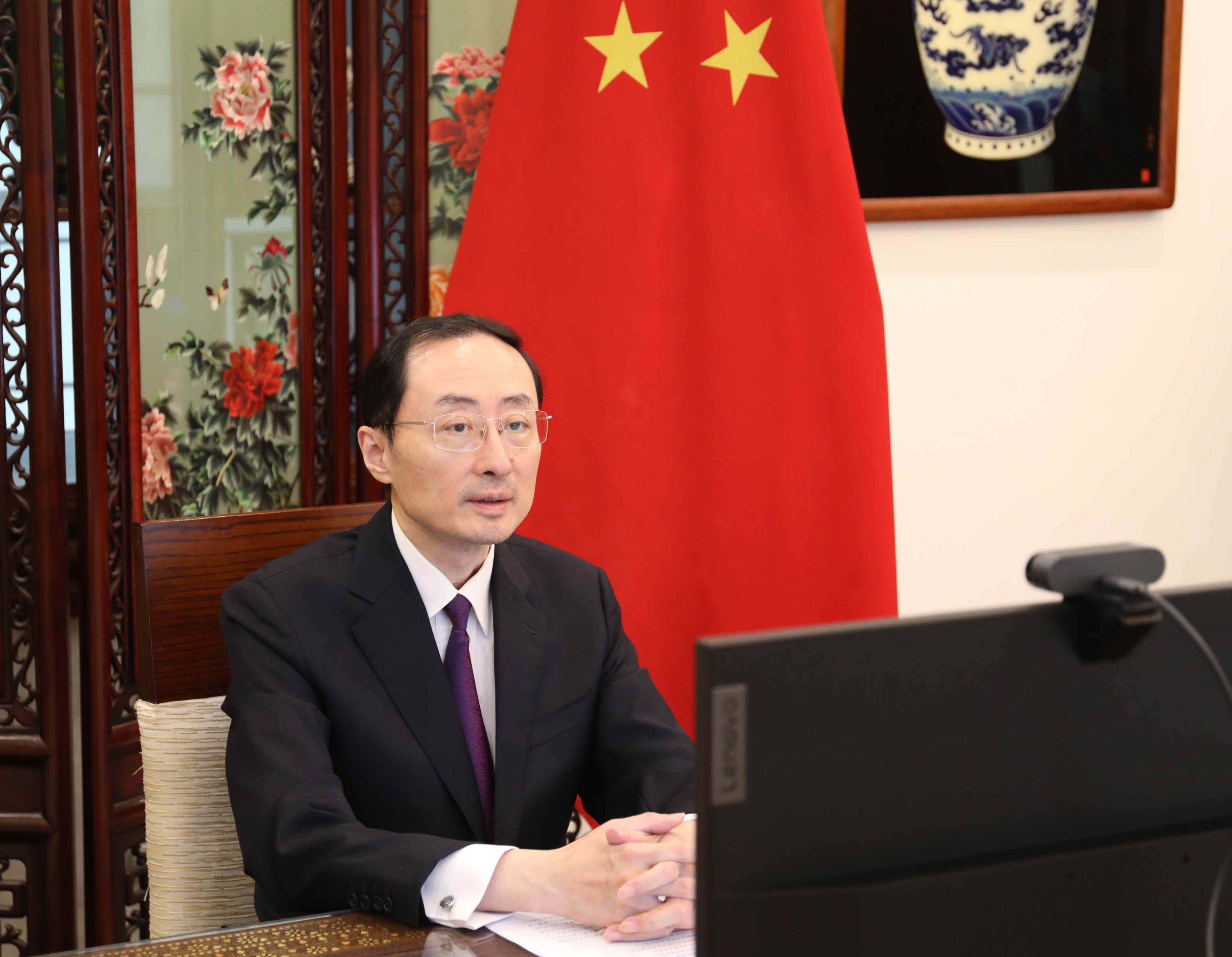
On September 23rd, Chinese Ambassador to India Sun Weidong attended the opening ceremony of the 4th High-level Track II Dialogue on China-India Relations co-hosted by School of International Studies of Sichuan University (SCU), China Center for South Asian Studies and Manohar Parrikar Institute for Defence Studies and Analyses (MP-IDSA) in India on invitation and delivered a speech in virtual format. Former Chinese State Councilor H.E. Mr. Dai Bingguo attended the opening ceremony.
The following is the transcript of Ambassador Sun Weidong's remarks:
Your Excellency Mr. Dai Bingguo, former State Councilor of China,
Scholars from China and India,
Ladies and Gentlemen,
Good afternoon!
It is my great honor to attend the 4th High-level Track II Dialogue on China-India Relations. First of all, I would like to express thanks to H.E. Mr. Dai Bingguo for his devotion to the China-India relations. His deep insights into China-India relationship have always been a source of inspiration for us, and helping us to see through the "mist" and find the right direction for the bilateral relations. Thanks to the Sichuan University and MP-IDSA for their elaborate preparations for this online event. Today's participants are important scholars and specialists from the two countries, many of whom have previously shouldered important responsibilities in diplomatic, military and economic fields. I would like to take this opportunity to have a candid and in-depth exchange of views with you.
Since last year, China-India relations has witnessed difficulties unseen for many years. The relations remain at a low level. At present, the world is entering a period of turbulence and change, while the Covid-19 pandemic is still spreading, the global economy remains sluggish in recovery, and the sudden changes in Afghanistan brought about significant impact on the regional situation. As the two largest developing countries and emerging economies, China and India should strengthen coordination and cooperation, join hands in fighting the pandemic, seek common development and rejuvenation, uphold Asian solidarity, and promote the world's peace and development. The current status of bilateral relations are obviously not in the fundamental interest of either side. Many far-sighted people from both countries have advocated that China and India should improve their relations, and bring the China-India relations back on track. I'd like to share my opinions on this.
First, as two major oriental countries, China and India should avoid falling into the trap of outdated western thinking. Analyzed from the prism of so called realism in international relations theories of the west, China and India, as two neighboring major countries, would inevitably view each other as threat and adversary, whose main interactive patterns would be competition and confrontation, and the result that one gains while the other loses would be unavoidable. "Sphere of influence", "zero-sum game", and "seeking hegemony" would be often repeated. The western mindset of power politics and the law of the jungle runs counter to the trend of the 21st century which is peace, development and win-win cooperation. It gains no support from the peoples. Today, even for the most powerful country in the world, it is doomed to fail to make wanton military intervention in other countries and impose their own values and social systems onto others. Afghanistan is the latest example.
As ancient civilizations, China and India have always pursued the visions of "universal peace" and "Vasudhaiva Kutumbakum" (the world being one family),advocated the principles of inclusiveness and harmony,seeking common ground while shelving differences. We should take the path of peaceful development to deliver a better life for our peoples, rather than repeat the mistake in history and choose a wrong path of confrontation and conflict between two major developing countries. China does not subscribe to the notion that a country is bound to seek hegemony when it grows in strength. Our historical wisdom shows that a country will decline if it seeks hegemony. However strong it may grow, China will never seek hegemony or expansion. Some Indian people think that China has become India's "major threat" and "strategic rival". It is a serious strategic miscalculation. If such judgment is translated into India's foreign policy, it would probably become a "self-fulfilling prophecy", which is not what we want to see.
Second, we should view the bilateral relations from a comprehensive rather than one-sided perspective. China-India relations are multi-faceted and multi-dimensional.Despite disputes and differences, there are more consensus and cooperation. Every field of bilateral relations should promote rather than undercut each other. We should avoid taking a part for the whole, or losing sight of the forest for the trees. For example, peace and tranquility in the border areas is important, but it is not the whole story of the bilateral relations.
The Chinese side has always viewed China-India relations from a strategic and long-term perspective and made unremitting efforts to this end. When India was hit by the second wave of Covid-19, China immediately offered a helping hand and overcame difficulties to ensure smooth medical supplies to India. Pragmatic cooperation between China and India conforms to the needs of both sides and is highly complementary. Despite the impact of the pandemic, our economic and trade cooperation has bucked the trend. In the first half of 2021, the bilateral trade reached $57.5 billion, with a year-on-year increase of 62%. The two countries share broad common interests on international and regional issues. Just in this month, leaders of the two countries attended the BRICS Summit and the Shanghai Cooperation Organization (SCO) Summit and discussed ways to address international and regional outstanding challenges. It takes only one party to impair a relationship, but takes two countries to build good relations. China-India relations should be a two-way street of mutual respect, accommodating each other's concerns while promoting win-win cooperation, not a one-way street that one side raises requests and set conditions while the other is forced to make responses.
Third, China and India should uphold strategic autonomy and grasp fate in our own hands. China and India both won independence and liberation in the middle of last century, have realized national development, and gained significant influence in the world. One of key reasons is our adherence to independence. For major countries like China and India with over 1 billion population, we can only rely on ourselves to achieve development. The primary task for both sides is to achieve development and rejuvenation, and focus on running our own affairs well. At present, some countries, with their ideological bias and Cold War mentality, vigorously seek closed and exclusive "small cliques" with the aim of containing a third party, stoking bloc confrontation and geopolitical games. In fact, containing others will not benefit a country with better development, nor will ganging up with others make one more secure. Once getting on someone else's ship, one is no longer able to have the steer in control. Twenty years ago, when the U.S. started the Afghan War, many countries boarded its chariot. Twenty years later, what benefits have these countries gained? We should uphold true strategic autonomy, not only in words, but more importantly, in deeds.
Friends,
This year we have celebrated the centenary of the founding of the CPC. President Xi Jinping solemnly declared that we have realized the first centenary goal of building a moderately prosperous society in all respects. This means that we have brought about a historic resolution to the problem of absolute poverty in China, and we are now marching toward the second centenary goal of building China into a great modern socialist country in all respects. India is also moving towards its own development goals. Both China and India need a sound external environment, especially a harmonious neighborhood. We should bear in mind the fundamental interests of our two countries, and explore ways for the two neighboring major countries to live in harmony and achieve common development and rejuvenation.
First of all, China and India should enhance mutual trust and stick to the right direction of the bilateral relations. We need to build a solid foundation for mutual trust, uphold the strategic consensus of being opportunities of development and cooperation partners to each other instead of being threats or competitive rivals. We need to carefully maintain the mutual trust, avoid doing anything that harms mutual trust, no matter how small it is. We need to do our best to push forward everything that benefits mutual trust, no matter how difficult it is. It is hoped that India will respect China's core interests on issues related to Tibet, Taiwan, South China Sea etc., take a prudent attitude in words and actions, and keep its commitments. Both sides should remove disruptions to mutual trust, refrain from interference in each other's internal affairs or engagement in any "alliance" or "quasi alliance" targeting the other, and avoid being alienated by third party. In order to foster an atmosphere of mutual trust, officials, think-tanks and media should send out more rational and constructive messages, not the other way around.
Secondly, China and India should strengthen dialogue and promote cooperation. This year, State Councilor and Foreign Minister Wang Yi had several meetings and phone conversations with the Indian External Affairs Minister Dr. Jaishankar. A few days ago, they met in Dushanbe. We need to strengthen communication and dialogue at various levels and in all fields, and push for the gradual improvement of the relations between the two countries. There is huge potential in economic and trade cooperation between the two countries. However, the bilateral cooperation has faced some restrictions imposed intentionally by the Indian side since last year. We should build bridges instead of walls, complement each other instead of decoupling. It is hoped that India will provide a fair, just and non-discriminatory business environment for Chinese companies to invest and operate in India. If all Chinese companies are driven away or squeezed out of the India market, what would India gain from it? This question is worth thinking twice. Besides, China and India can also strengthen communication and coordination on multilateral issues, respond to global challenges together such as combating the pandemic, disaster prevention, poverty eradication, energy security and climate change, so as to safeguard the common interests of developing countries.
Thirdly, China and India should properly handle differences and not allow differences to become disputes. We should place the border issue in an appropriate position in bilateral relations and seek a fair, reasonable and mutually acceptable solution through dialogue and consultations. China has always been positive to seek a proper solution to the China-India border issue. The current overall situation in the border area was gradually de-escalated. We hope that the Indian side will meet us halfway to move the situation towards stability and shift it from urgent dispute settlement to regular management and control, so as to jointly safeguard the peace and tranquility of the border area. For differences in other areas, we also need to focus on narrowing them instead of aggravating the situation, and seek solutions acceptable to both sides through frank communication.
At present, China-India relations have come to a crossroad once again, and we need to make the right choice. Ultimately, China and India should work together to take the broad road of mutual respect, dialogue, cooperation and mutual benefit, rather than the narrow log bridge of mutual confrontation, suspicion, attrition and zero-sum competition. I hope all participants could candidly exchange views on the China-India relations, and make suggestions responsibly for bringing the China-India relations back to the track of healthy and stable development. Finally, I wish the dialogue a full success.
Thank you!




